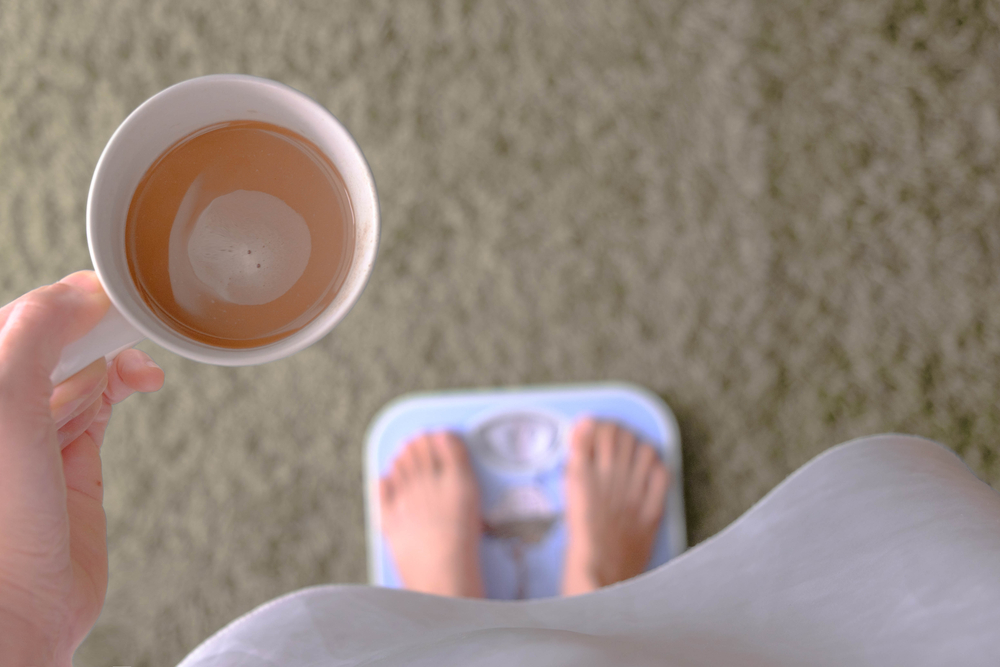Does Coffee Make You Gain Weight? Let’s Find Out!


What kinds of words come to mind when we think about coffee? Soul soothing, pick-me-up, energy-boosting, and good vibes perhaps? What about weight gain? Now that is something we don’t want to hear!
Yet more and more people are talking about coffee and metabolism, coffee and hormones, and coffee and weight gain.
So what are the facts, what are the myths, and is coffee and weight gain just one big, fat lie? Let’s get into it.
We Need Coffee!
When it comes to beverages coffee is head and shoulders above “the competition” in so many ways. For millions the world over, each morning a nice, strong cup of coffee puts that extra bit of pep in our step.
When we drink coffee it tends to fill us up for a while, postponing our appetite for our next meal, too.
And, when many people make their way to the bathroom in the morning – to get ‘things’ moving – they usually attribute this to their morning cup of magic. So it seems weird that coffee can cause weight gain. The truth is it can, and it can’t.
It all depends on three things:
- How you take your coffee.
- How much coffee you drink.
- When you drink your coffee. (1)
We Have Mixed Drinks About Feelings
Coffee plays a vital role in many of our daily lives, whether we like to grab an espresso, a cappuccino, or an iced latte. If you like your coffee strong and black it’s quite likely you are going to stay skinnier.
Coffee in its purest form is low in calories and high in caffeine. Experts even say if you are attempting to reduce your total calorie intake, replacing high-calorie beverages — such as soda, juice, or chocolate milk — with plain coffee is a good place to start. (1)
Yet when you start adding in sugar, which has no nutritional value, this can add up to a much higher calorie count. Artificial sweeteners, which may also have uncertain health risks, can also do the same. Certain milk and creams are fatty also. (3)
Here are some calorific statistics to consider when choosing what not to order in the coffee queue:
- FLAT WHITE – 120 calories and 7 grams of fat.
- LATTE – the same as a flat white.
- CAPPUCCINO – 110 calories and 6 grams of fat.
- MACCHIATO – Only 13 or 18 calories depending on whether the milk added is skim or full cream. Many will add sugar, which will add 15 calories per teaspoon!
- PICCOLO LATTE – 45 calories with full cream milk or 25 if you go for skim.
- MOCHA – 160 calories and 6 grams of fat for a full-cream version, or 100 calories and virtually no fat for the skim milk version.
- SOY LATTE – 80 calories and 3 grams of fat.
- CHAI LATTE – 130 calories, 2 grams of fat, but an extra 20 grams with 4 teaspoons of sugar (commonplace already added).
- BULLETPROOF COFFEE – By adding butter or coconut oil to coffee, a whopping 50 grams of fat is added, and almost 2000kJ per serving! (2)
And the one you’ve been waiting for black coffee on its own – a plain cup of brewed coffee has less than 5 calories and no (zero) fat. (2,3)
So if you want to slip into your little black dress, stop dressing up your coffee with extras!
Too Much Coffee Causes Hormonal Chaos
Research shows that regular caffeine intake may improve body weight maintenance and weight loss, and that caffeine may improve your metabolism — a measure of how many calories your body burns each day. This is one reason why caffeine is included in many weight loss supplements. (1)
However too much coffee and caffeine can cause certain hormones levels to both rise and fall, producing dramatic changes in our bodies in different ways:
- Coffee stimulates the release of gastrin, the main gastric hormone, which shortens the time it takes for food to pass through the digestive tract. Coffee can also stimulate the release of bile and digestive enzymes (which is why some people rush to the bathroom after drinking coffee). (4)
- Caffeine increases blood sugar levels. Blood sugar fluctuations cause the hormone cortisol to spike, which can give a much-needed energy boost, but too much release of cortisol can exhaust the adrenals. And afterward, when blood sugar levels drop, we need an emergency fix to bring them back up. This is why people who consume coffee for breakfast or eat sugary and processed breakfast, may crave carbs and sugar later in the day. When used in moderation (400 milligrams or less) by healthy adults, caffeine intake is generally safe. (5,6)
- Another hormonal consequence that coffee contributes to is estrogen dominance which can cause bloating. Studies have shown that more than that two cups of coffee a day may increase estrogen levels. Excessive coffee consumption is also associated with a reduction in progesterone. And with low progesterone and estrogen being dominant, this can cause weight gain. (7,8)
Kiss Hormone Problems Goodbye
If you have been drinking more than 2 cups of coffee per day, and you think this may have affected your hormones, it’s a good idea to have them checked.
A home saliva test may help with this, or a blood sample test for more accuracy. Sometimes it’s beneficial to use online guides, groups, or experts, to find more expansive discussions you won’t find elsewhere.
People who have been through similar experiences can help and support, for example check out Dorian Marie, from Get A Happy Body.
By examining your hormone problems and sharing them with others, you can have some intimate conversations that offer suggestions on how to handle them.
Insomnia Queens (And Kings)
Caffeine acts as a stimulant by inhibiting the effects of adenosine, a chemical in your brain that causes sleepiness, so it makes sense not to drink coffee in the evenings if you want a decent night’s rest. Poor sleep is associated with higher body weight, increased appetite, and cravings. (1,9)
Largely this is down to reduced leptin and elevated ghrelin hormone levels, and in Western societies, where chronic sleep restriction is common and food is widely available, changes in appetite regulatory hormones with sleep curtailment may contribute to obesity.
It has been found that drinking caffeine may reduce leptin levels, and disrupt ghrelin hormone levels, and endogenous peptides associated with hunger and satiety. Decaffeinated coffee on the other hand seems fine to drink before bedtime if you still wish for coffee after hours. (11)
And men, it’s worth noting that caffeine consumption can affect males to a greater extent than females, and some hormonal changes can happen to a man as soon as ten minutes after a cup is consumed.
Consumption of caffeinated coffee increases total testosterone levels, and decreases total and free estradiol in men, as well as many of the other hormonal disruptors discussed above. (13,14)
Lastly, the human body was designed to run on water, not coffee. Drinking enough water in a day can regulate hormones and flush our systems out at the same time. So be sure to drink plenty of water between cups of coffee.
Coffee is downright delicious, and if you stick to the advice above, it’s unlikely you’ll ever have to worry about coffee and weight gain. (12)
Sources:
- https://www.healthline.com/nutrition/coffee-and-weight-gain
- https://www.news.com.au/lifestyle/health/diet/this-is-the-healthiest-choice-when-it-comes-to-coffee/news-story/bf5c78ff680ab24f6ab4f2cad2c8d669
- https://www.mayoclinic.org/healthy-lifestyle/weight-loss/expert-answers/calories/faq-20058100
- https://pubmed.ncbi.nlm.nih.gov/10499460/
- https://pubmed.ncbi.nlm.nih.gov/9846599/
- https://www.mayoclinic.org/healthy-lifestyle/weight-loss/expert-answers/caffeine/faq-20058459
- https://www.drlamcoaching.com/adrenal-fatigue/symptoms/estrogen-hormone-dominance/
- https://www.healthline.com/health/womens-health/low-progesterone
- https://www.ncbi.nlm.nih.gov/pmc/articles/PMC535701/
- https://www.ncbi.nlm.nih.gov/pmc/articles/PMC6298130/
- https://pubmed.ncbi.nlm.nih.gov/23204152/
- https://my.clevelandclinic.org/health/treatments/9013-dehydration
- https://www.sciencedaily.com/releases/2008/12/081222113526.htm
- https://www.ncbi.nlm.nih.gov/pmc/articles/PMC3502342/









